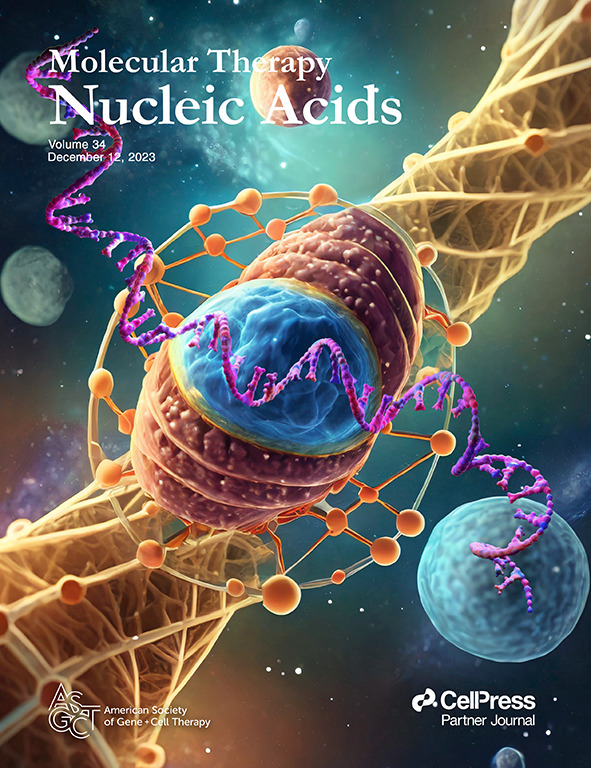Correction of human non-sense mutation via adenine base editing for Duchenne muscular dystrophy treatment in mouse
IF 6.5
2区 医学
Q1 MEDICINE, RESEARCH & EXPERIMENTAL
引用次数: 0
Abstract
Duchenne muscular dystrophy (DMD) is the most prevalent herediatry disease in men, characterized by dystrophin deficiency, progressive muscle wasting, cardiac insufficiency, and premature mortality, with no effective therapeutic options. Here, we investigated whether adenine base editing can correct pathological non-sense point mutations leading to premature stop codons in the dystrophin gene. We identified 27 causative nonsense mutations in our DMD patient cohort. Treatment with adenine base editor (ABE) could restore dystrophin expression by direct A-to-G editing of pathological nonsense mutations in cardiomyocytes generated from DMD patient-derived induced pluripotent stem cells. We also generated two humanized mouse models of DMD expressing mutation-bearing exons 23 or 30 of human dystrophin gene. Intramuscular administration of ABE, driven by ubiquitous or muscle-specific promoters could correct these non-sense mutations , albeit with higher efficiency in exon 30, restoring dystrophin expression in skeletal fibers of humanized DMD mice. Moreover, a single systemic delivery of ABE with human sgRNA could induce body-wide dystrophin expression and improve muscle function in rotarod tests of humanized DMD mice. These findings demonstrate that ABE with human sgRNAs can confer therapeutic alleviation of DMD in mice, providing a basis for development of adenine base editing therapies in monogenic diseases.通过腺嘌呤碱基编辑纠正人类非有义突变,治疗小鼠杜氏肌营养不良症
杜兴氏肌营养不良症(DMD)是男性最常见的遗传性疾病,其特点是肌营养不良、进行性肌肉萎缩、心功能不全和过早死亡,但目前尚无有效的治疗方案。在此,我们研究了腺嘌呤碱基编辑能否纠正导致肌营养不良基因过早终止密码子的病理性无义点突变。我们在 DMD 患者队列中发现了 27 个致病性无义突变。使用腺嘌呤碱基编辑器(ABE)可以通过直接从 A 到 G 编辑 DMD 患者诱导多能干细胞产生的心肌细胞中的病理性无义突变,从而恢复肌营养不良蛋白的表达。我们还生成了两种表达人类肌营养不良蛋白基因 23 或 30 外显子突变的人源化 DMD 小鼠模型。在无处不在的启动子或肌肉特异性启动子的驱动下,肌肉注射ABE可纠正这些非有义突变,尽管30号外显子的效率更高,从而恢复了人源化DMD小鼠骨骼纤维中肌营养不良蛋白的表达。此外,单次全身给药含有人类 sgRNA 的 ABE 可诱导全身性肌营养不良蛋白的表达,并改善人源化 DMD 小鼠在转体测试中的肌肉功能。这些研究结果表明,含有人类 sgRNA 的 ABE 可使小鼠的 DMD 病情得到治疗性缓解,为开发单基因疾病的腺嘌呤碱基编辑疗法奠定了基础。
本文章由计算机程序翻译,如有差异,请以英文原文为准。
求助全文
约1分钟内获得全文
求助全文
来源期刊

Molecular Therapy. Nucleic Acids
MEDICINE, RESEARCH & EXPERIMENTAL-
CiteScore
15.40
自引率
1.10%
发文量
336
审稿时长
20 weeks
期刊介绍:
Molecular Therapy Nucleic Acids is an international, open-access journal that publishes high-quality research in nucleic-acid-based therapeutics to treat and correct genetic and acquired diseases. It is the official journal of the American Society of Gene & Cell Therapy and is built upon the success of Molecular Therapy. The journal focuses on gene- and oligonucleotide-based therapies and publishes peer-reviewed research, reviews, and commentaries. Its impact factor for 2022 is 8.8. The subject areas covered include the development of therapeutics based on nucleic acids and their derivatives, vector development for RNA-based therapeutics delivery, utilization of gene-modifying agents like Zn finger nucleases and triplex-forming oligonucleotides, pre-clinical target validation, safety and efficacy studies, and clinical trials.
 求助内容:
求助内容: 应助结果提醒方式:
应助结果提醒方式:


